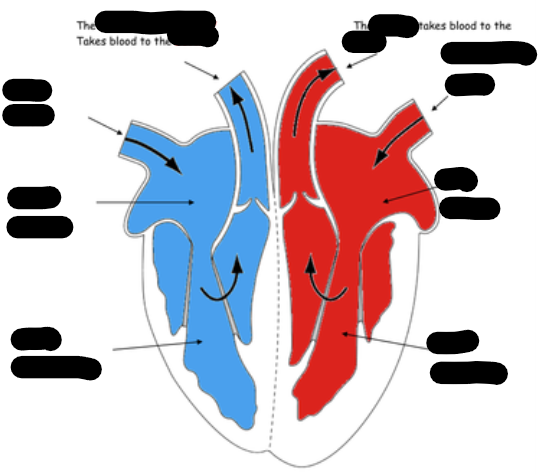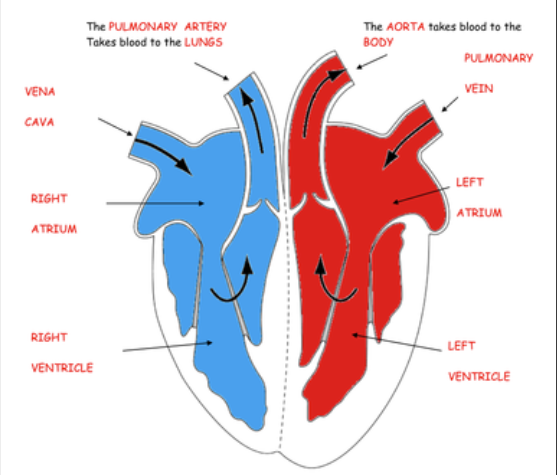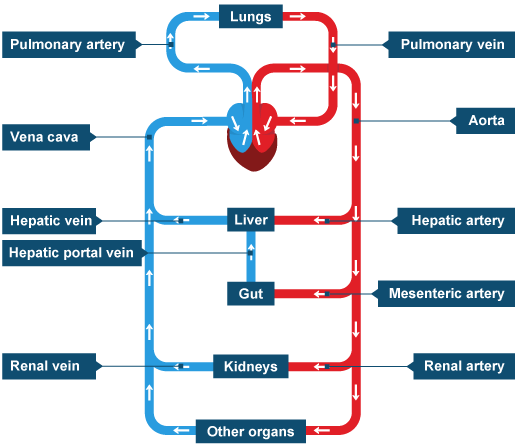LV Biology - Transport in Humans
1/14
There's no tags or description
Looks like no tags are added yet.
Name | Mastery | Learn | Test | Matching | Spaced | Call with Kai |
|---|
No analytics yet
Send a link to your students to track their progress
15 Terms
Why can unicellular organisms rely on diffusion for movement of substances in and out of the cell?
Unicellular organisms have very large SA : V ratio meaning that the distance between the surface of the organism to its centre is very small
Why do multicellular organisms need a transport system?
They consist of many cells that differentiate to take on specialized functions.
They have a small surface area to volume ratio, so transport systems are needed to get substances to the correct place.
Transport systems supply cells with useful substances (e.g. glucose and oxygen) and remove waste products.
Eg. Circulatory system in humans
Composition of Blood
Red blood cells, White blood cells, Platelets and Plasms
The Role of Plasma
Transporting dissolved carbon dioxide, digested food molecules, urea and hormones; distributing heat
Adaptations of Red Blood cells so they are suitable for the transport of oxygen
Contain haemoglobin: Haemoglobin can combine reversibly with oxygen. This means that it can combine with oxygen as blood passes through the lungs, and release the oxygen when it reaches the cells.
They have no nucleus so they can contain more haemoglobin.
They are small and flexible so that they can fit through narrow blood capillaries.
They have a biconcave shape to maximise their surface area for oxygen absorption.
They are thin, so there is only a short distance for the oxygen to diffuse to reach the centre of the cell.
Phagocytes
Engulf and destroy unwanted microorganisms that enter the blood, by the process of phagocytosis.
(Part of the immune system)
Lymphocytes
Produce antibodies when a foreign body such as a microorganism enters the body:
they bind to pathogens and damage or destroy them
they coat pathogens, clumping them together so that they are easily ingested by phagocytes
they bind to the pathogens and release chemical signals to attract more phagocytes
Lymphocytes may also release antitoxins that stick to the toxins that the microorganism makes, which stops it damaging the body.
(Part of the immune system)
How do vaccines work?
Allow a dead or altered form of the disease causing pathogen to be introduced into the body, which contain a specific antigen. This causes the immune system, specifically the white blood cells, to produce complementary antibodies, which target and attach to the antigen.
Platelets
They have proteins on their surface that enable them to stick to breaks in a blood vessel and clump together
They secrete proteins that result in a series of chemical reactions that make blood clot, which plugs a wound

Structure of the Heart

How and what factors may increase the risk of developing coronary heart disease?
poor diet – eating more saturated fat tends to increase cholesterol levels
stress and smoking – increases blood pressure
salt – eating too much causes high blood pressure
lack of exercise
genetic factors
Arteries: Adaptations
Have thick muscular and elastic walls to accommodate and pump blood and withstand high pressures and stretch + recoil
Have connective tissue to provide strength
Veins: Adaptations
Have thin walls
Have valves to prevent backflow of blood
Large lumen as there are low pressures
Capillaries: Adaptations
Walls one cell thick: therefore allow the exchange of molecules between the blood and the body's cells - molecules can diffuse across their walls
General structure of circulation system
